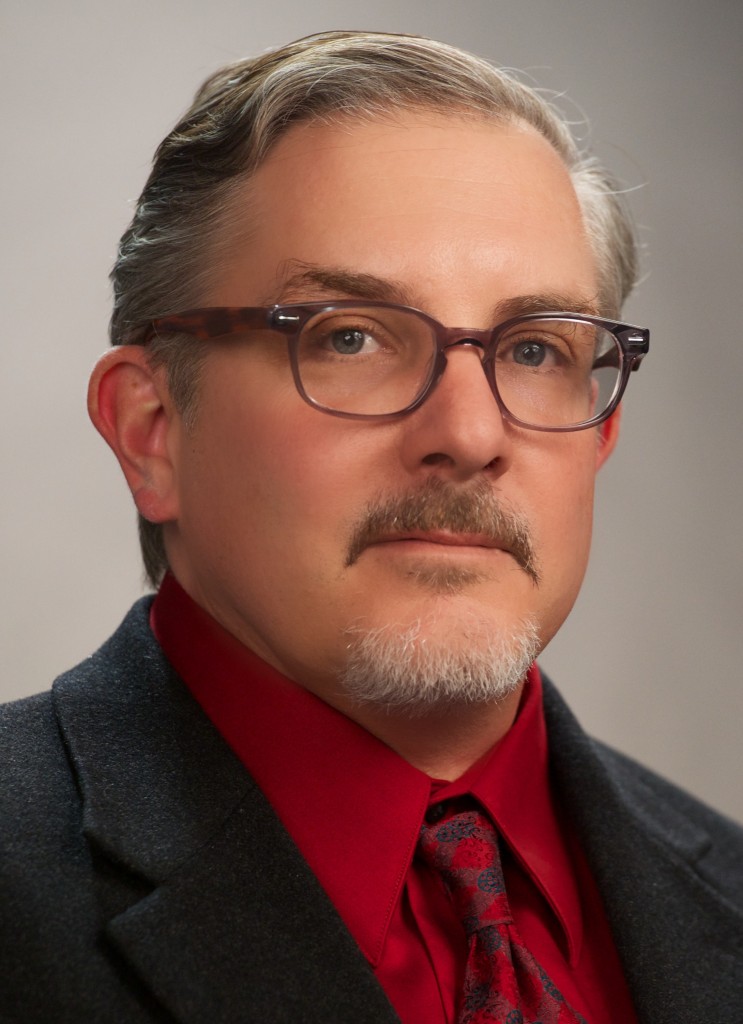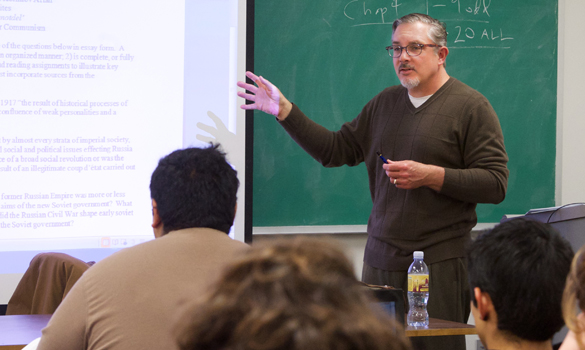 California State University, Dominguez Hills assistant professor of history Christopher Monty has a passion for learning and imparting the ability to learn, traits he considers the hallmark of teaching excellence. For such, and upon the recommendation of the Faculty Leaves and Honors Committee, he has been honored with the 2013 Lyle E. Gibson Distinguished Teacher Award.
California State University, Dominguez Hills assistant professor of history Christopher Monty has a passion for learning and imparting the ability to learn, traits he considers the hallmark of teaching excellence. For such, and upon the recommendation of the Faculty Leaves and Honors Committee, he has been honored with the 2013 Lyle E. Gibson Distinguished Teacher Award.
“[This recognition] means a great deal because it is an award that’s, well, the president makes the final decision, but it’s based on the recommendations of the Faculty Leaves and Honors Committee, a committee essentially of my peers. So, It’s very gratifying to receive that kind of recognition,” Monty said. “It’s also somewhat humbling because I know in my own department there are many other outstanding teachers. In every program, among my colleagues in the College of Arts and Humanities, …there are many, many outstanding teachers.”
Although Monty reasoned the award doesn’t distinguish him from his peers, he has nevertheless established a record of excellence in supporting student success. Ever striving to do better, receiving the award has made him introspective.
“It’s made me conscious again of my responsibilities as a teacher,” Monty acknowledged, adding with a tone of humor, “For the two or three days after I received the notice [of the award], I left each of my classes thinking, ‘Gosh, I just did a terrible job.’”
Upon earning a Ph.D. in modern European history from the University of California, Los Angeles, Monty began teaching primarily lower division survey courses in world history and western civilization at several community colleges and universities in Southern California, including Santa Monica College; CSU San Marcos; Loyola Marymount; UCLA; and University of Southern California.
“It was really only when I was hired [at CSU Dominguez Hills] full time in fall 2007, that I had an opportunity to teach a full range of courses a historian would hope to teach, including theory and methods of history, disciplinary research and writing skills,” Monty recalled.
Having spent months on end in Moscow conducting research as a Fulbright-Hays Dissertation Research Fellow in 2000, and becoming an expert in Russian history and fluent in Russian, Monty reveled in the chance to teach a wide array of upper division courses, in addition to lower division pre-requisite courses, and not only world history, but Russian and European history.
“I felt like that gave me renewed energy as teacher,” Monty said. “I began to grow [as a teacher] much more dramatically once I got here because I had so many more opportunities to interact with students.”
Monty’s interest in history began after watching “The Day After,” a 1983 movie about surviving a nuclear holocaust, as well as taking notice of political occurrences of the time. As an undergraduate college student he took courses in political science, international relations during the Cold War, and Soviet and American foreign policy.
“I found myself very dissatisfied with the literature, because it just seemed that the United States and the Soviet Union appeared as caricatures of themselves …Especially the Soviet Union in the way it was represented in Western literature on Soviet foreign policy… This idea that one man in the Kremlin decided everything, and the Soviets were this odd combination of all the traditional failings of the Russians, plus the added sin of Marxism and Leninism,” Monty recounted. “That led me to an interest in the history of Russia and the Soviet Union because I thought, ‘there’s got to be something more than this.’”
There was much more, and Monty became an expert on it.
With expertise in Russian and European history, he has a repertoire of a dozen courses he teaches at CSU Dominguez Hills, including three upper division courses of a required nine-unit sequence for history majors: Research and Writing (HIS 300), Theory and Practice of History (HIS 304), and the capstone Senior Seminar in History (HIS 490); a world history course designed for students planning a career as single-subject middle or high school history social science teacher (HIS 315); and electives such as Cultural History (HIS 376), the Russian Empire (HIS 318), and the Soviet Union (HIS 319).
He teaches about American foreign relations during the Cold War in Topics in U.S. Diplomatic History (HIS 352), as well as a class on film and history. At the lower division he teaches both ancient and modern world history.
 Monty not only inspires students in the classroom through dynamic teaching of history in the context of an ever-changing political landscape, but he helps guide them through their academic progress.
Monty not only inspires students in the classroom through dynamic teaching of history in the context of an ever-changing political landscape, but he helps guide them through their academic progress.
“I go out of my way to accommodate [students’] needs outside the classroom,” he said.
Working as a faculty advisor in the University Advisement Center for 10 hours a week for two years, Monty was able to provide students with information and advice concerning matriculation agreements and transcripts.
“That experience was incredibly valuable because it made me a more capable advisor for history majors. It helped me to better understand especially our first-time freshman population and the challenges many of them face,” Monty said.
As a result of his initiative, the history department recognizes student achievement during an annual reception. He also served as a faculty advisor for the history students’ club, until it was folded into the campus chapter of the national history honor society Phi Alpha Theta, and he remains on the Commencement Committee, a post to which he was appointed when he arrived to campus six years ago.
In faculty-related service, he has served as chair of the history department Curriculum Committee, a member of the Program Review Panel, and the history department representative for the Academic Senate.
He has published several papers on Stalinist politics, is working on two more, and is planning to someday complete a book manuscript on Stalin’s rise to power in the Communist Party.
Currently an assistant professor at CSU Dominguez Hills, Monty asserted that he hopes to stay at the university to achieve a personal goal, and program objective for the history faculty, of preparing students for a wide array of careers and graduate programs.
“I hope to spend my entire career here, building a better history department and helping to build up and improve the College of Arts and Humanities and contributing to the university in whatever way I can,” he said.